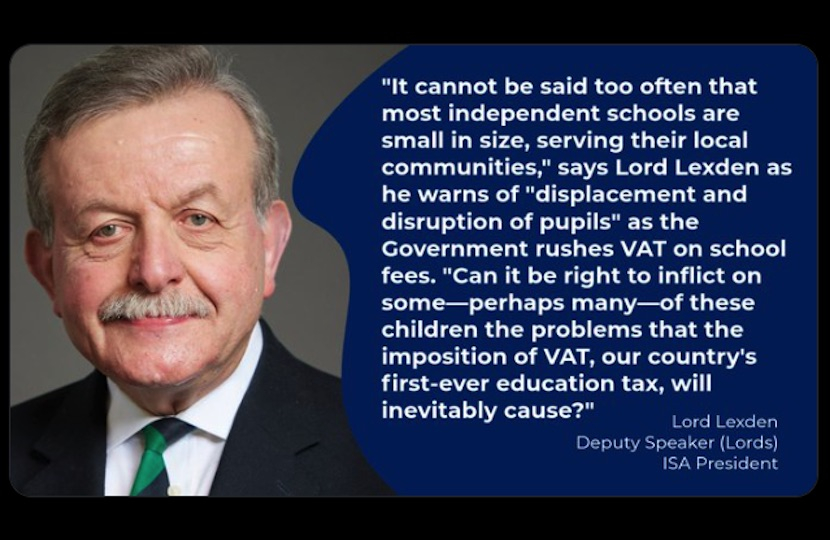
The Government are making a bad policy even worse by rushing to impose VAT on independent school fees on I January, just two and a half months away, in the middle of a school year. Opening a short debate in the Lords on 17 October, Alistair Lexden set out the grave problems that the Government have created for schools by rushing ahead. The Education Minister in the Lords, Baroness Smith of Malvern, provided no satisfactory replies—as usual. She will be tackled again and again on future occasions.
I declare my interest as a former General Secretary of the Independent Schools Council, and the current President of the Independent Schools Association, one of the Council’s constituent bodies, whose 670 members—generally small in size with great strengths in special needs, bilingual teaching and the performing arts—are particularly at risk as a result of the Government’s VAT plans.
The Council acts on behalf of some 1,400 schools, which are educating around 80 per cent of the 600,000 children in the independent education sector.
It ought surely to be the duty of each and every government regardless of political complexion to value and to safeguard all children in our country’s schools.
The education of the many thousands in independent schools ought never be harmed by the actions of government.
Can it be right to inflict on some—perhaps many—of these children the problems that the imposition of VAT, our country’s first ever education tax, will inevitably cause?
Nevertheless, this very short debate is not about whether VAT should be slapped on school fees. The die is cast. Labour’s election manifesto said quite explictly that VAT would be extended to school fees, and the Government are proceeding at breakneck speed to get it introduced.
This debate is about the great haste with which the Government are acting. Out of the blue, schools were told at the end of July that they would start paying VAT five months later on I January next year.
Five months to alter plans and budgets that had been fixed for the academic year starting in September. Five months, of which they received notice during the school summer holidays, during which the Treasury held a consultation exercise covering a whole host of technical details.
The Government say blithely that five months are quite sufficient to prepare for this unprecedented change.
May I ask the noble Baroness the Minister this question? Would the Government ever contemplate asking state schools to redo their plans for a new academic year at such short notice?
Taxation apparently trumps the education and welfare of children in our country’s independent schools. The Treasury want to start getting in cash as fast as they can.
Last week in the Commons a Treasury Minister said: “we want to raise the money as soon as possible”, adding breezily yet again that “there will have been five months for parents and schools to prepare.”
Glorious things are promised from the VAT receipts: 6,500 extra teachers, 3,000 new nurseries, breakfast clubs in all primary schools. All these benefits from money which, if the Government should manage to raise their levy target of £1.5 billion, will represent just over one per cent of the total education budget.
A degree of scepticism about these promises might be in order.
Will the £1.5 billion target be reached? The crucial issue is the extent to which the education tax will force parents to move their children to state schools.
The Government say the numbers will be small. They have not bothered to make any assessment themselves. They are placing their faith entirely in one single report produced by the Institute of Fiscal Studies.
This suggests that between 4 and 7 per cent of children will “migrate”—a singularly inapposite term for the displacement and disruption of pupils during their school careers.
That would mean up to 40,000 children would be unable to continue their education in the schools their parents had chosen for them. That in all conscience would be bad enough. A number of other independent studies have calculated that the number will be much higher. The Government ignore them.
But even the author of the Government’s favoured report now has his doubts about its predictions. This is hardly surprising. The report itself declares that it is based on “relatively thin” evidence and “relatively old” data, garnished by details furnished by Catholic schools in America, whose relevance is unclear.
Last weekend the author of the IFS report said the Government’s education tax could destroy the continuity of education for far more children. 15 per cent could be forced to move. That means 90,000 children would be added to the number in state schools, virtually wiping out the £1.5 billion for which the Government introduced its education tax in the first place.
But such gloom is misplaced, say the Government, because, as the Treasury Minister, the noble Lord, Lord Livermore, told your Lorships a week ago “ very many private schools will take steps to absorb a proportion, or all, of the new VAT liability, so there may be no increases in fees.”
The noble Lord should get out and talk to those dealing with the financial affairs of independent schools. He would quickly discover that absorbing the education tax would mean cuts—above all to staff who account for 70 per cent of school costs.
No wonder the NASUWT has called for the new tax to be delayed until next September to try and find a way of reducing the prospect of job losses.
What about the large sums schools derive from their substantial capital assets, some say? They can be used to pay the education tax. No more than a small minority have any income from such sources.
It cannot be said too often that most independent schools are small in size, serving their local communities in which they are embedded and by which they are cherished.
4O per cent of independent schools have under 100 pupils. They have no handy reserves into which they can dip. They will be forced to jack up their fees by a massive 20 per cent in the middle of an academic year—after a period of 20 years in which fees have risen broadly in line with inflation.
What have the Government to say to the thousands of worried parents up and down our country? I will give just one example. A father in Worcester will have to move his son from an independent school at the end of this term. He writes: “we need a local school that will teach my son for his A-levels starting in January. You can’t possibly expect a young man to drop two years and restart A-level courses in different subjects. He is studying Greek, Latin and German. There is no local school that can provide what he needs.”
How would the noble Baroness the Minister reply to this distressed parent?
Independent schools are surely entitled to expect clear, comprehensive guidance on what they must do when the education tax takes effect in two and a half months time. They have not got it.
What was issued to them a week ago by HMRC is woefully inadequate. In a letter to the Treasury last Monday, the Independent Schools Council described it as “disheartening and disappointing. It does not provide the clear and comprehensive overview schools need. The guidance is confusing, partial and lacking in relevant examples for schools. They may have just a single book-keeper who will be a novice on VAT matters. Clear and understandable guidance is needed if mistakes are not to be made”.
Will the noble Baroness the Minister give a firm commitment that this crucial guidance will be revised and reissued? Nothing could illustrate more clearly the folly of rushing to bring in the education tax on I January.
Could the noble Baroness the Minister tell the House if anyone—anyone at all-- outside the Labour Party itself has said they support the introduction of the tax on 1 January?
In the long debate which I introduced six weeks ago, much disquiet was expressed about the ways in which VAT will affect service and diplomatic families defending and representing our nation overseas; the families of some 90,000 children with special needs who are thriving in independent schools without Education and Health Care Plans which are so difficult, and often costly, to get; and families – Muslim, Jewish and others -- who depend on the small, low-cost faith schools in the independent sector.
Will the Government now find the time to consider with great care the needs of these many, desperately worried families? To do that, they should halt the dash to impose VAT on 1 January.

